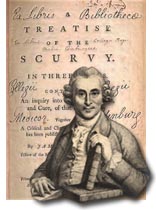James Lind Alliance
James Lind Alliance (JLA) is a non-profit initiative established with the primary goal of bridging the gap between patients, caregivers, and healthcare professionals to identify and prioritize the top uncertainties, or 'unanswered questions', about the effects of treatments that they agree are most important. This collaborative effort aims to ensure that those who fund health research are aware of what matters most to patients and clinicians.
History[edit | edit source]
The James Lind Alliance was founded in 2004, named after James Lind, an 18th-century Scottish doctor who conducted one of the first controlled clinical trials aboard a naval ship in 1747. This trial provided evidence of the effectiveness of citrus fruits in preventing scurvy, setting a precedent for the importance of evidence-based medicine. The JLA was established to embody Lind's ethos by emphasizing the importance of addressing research questions that are directly relevant to patients and clinicians.
Mission and Approach[edit | edit source]
The core mission of the JLA is to facilitate Priority Setting Partnerships (PSPs) that bring together patients, caregivers, and healthcare professionals to identify and prioritize unanswered questions or evidence uncertainties in specific areas of health and medical care. These PSPs aim to:
- Highlight the importance of patient, caregiver, and clinician experiences and insights in shaping research agendas.
- Ensure that research funding is directed towards studies that will make a real difference in patient care and outcomes.
- Increase awareness among researchers and funding bodies about the priorities of patients and clinicians.
The JLA approach involves a transparent and inclusive process, typically including surveys to gather uncertainties from participants, workshops to discuss and prioritize these uncertainties, and the publication of a final list of top priorities for research.
Impact[edit | edit source]
The work of the James Lind Alliance has led to the identification of numerous research priorities across a wide range of health conditions and treatments. These priorities have influenced research funding and agendas, leading to studies that are more closely aligned with the needs and concerns of patients and healthcare professionals. By focusing on unanswered questions that matter to patients and clinicians, the JLA helps to ensure that research efforts are relevant and impactful.
Challenges and Criticisms[edit | edit source]
While the James Lind Alliance has been praised for its innovative approach to involving patients and clinicians in the research prioritization process, it has also faced challenges and criticisms. These include:
- The need for extensive outreach to ensure diverse and representative participation in PSPs.
- The difficulty of translating identified priorities into funded research projects.
- Ensuring that the results of prioritized research are disseminated back to the patient and clinician communities.
Future Directions[edit | edit source]
The James Lind Alliance continues to expand its work, with ongoing efforts to establish new PSPs in various areas of health and medicine. There is also a growing focus on ensuring that the priorities identified through PSPs lead to funded research projects and that the results of this research are effectively communicated to all stakeholders.
Search WikiMD
Ad.Tired of being Overweight? Try W8MD's physician weight loss program.
Semaglutide (Ozempic / Wegovy and Tirzepatide (Mounjaro / Zepbound) available.
Advertise on WikiMD
|
WikiMD's Wellness Encyclopedia |
| Let Food Be Thy Medicine Medicine Thy Food - Hippocrates |
Translate this page: - East Asian
中文,
日本,
한국어,
South Asian
हिन्दी,
தமிழ்,
తెలుగు,
Urdu,
ಕನ್ನಡ,
Southeast Asian
Indonesian,
Vietnamese,
Thai,
မြန်မာဘာသာ,
বাংলা
European
español,
Deutsch,
français,
Greek,
português do Brasil,
polski,
română,
русский,
Nederlands,
norsk,
svenska,
suomi,
Italian
Middle Eastern & African
عربى,
Turkish,
Persian,
Hebrew,
Afrikaans,
isiZulu,
Kiswahili,
Other
Bulgarian,
Hungarian,
Czech,
Swedish,
മലയാളം,
मराठी,
ਪੰਜਾਬੀ,
ગુજરાતી,
Portuguese,
Ukrainian
Medical Disclaimer: WikiMD is not a substitute for professional medical advice. The information on WikiMD is provided as an information resource only, may be incorrect, outdated or misleading, and is not to be used or relied on for any diagnostic or treatment purposes. Please consult your health care provider before making any healthcare decisions or for guidance about a specific medical condition. WikiMD expressly disclaims responsibility, and shall have no liability, for any damages, loss, injury, or liability whatsoever suffered as a result of your reliance on the information contained in this site. By visiting this site you agree to the foregoing terms and conditions, which may from time to time be changed or supplemented by WikiMD. If you do not agree to the foregoing terms and conditions, you should not enter or use this site. See full disclaimer.
Credits:Most images are courtesy of Wikimedia commons, and templates, categories Wikipedia, licensed under CC BY SA or similar.
Contributors: Prab R. Tumpati, MD

